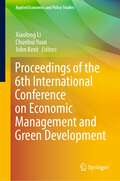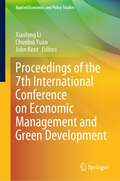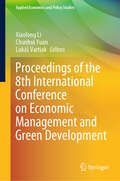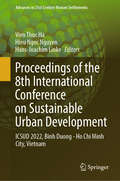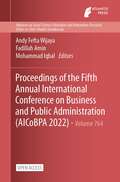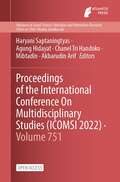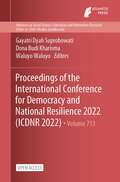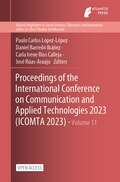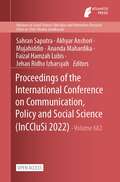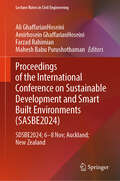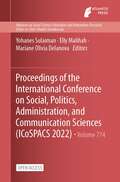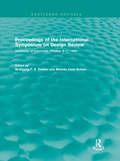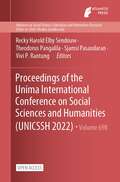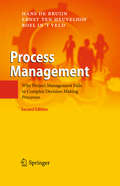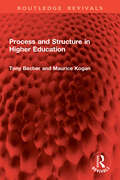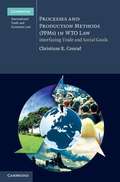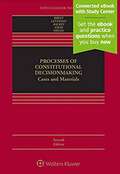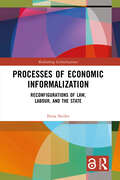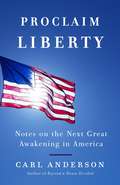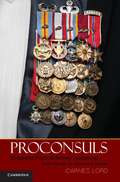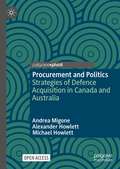- Table View
- List View
Proceedings of the 6th International Conference on Economic Management and Green Development (Applied Economics and Policy Studies)
by Xiaolong Li John Kent Chunhui YuanThis proceedings book, together with the conference, looks forward to spark inspirations and promote collaborations. International Conference on Economic Management and Green Development (ICEMGD) is an annual conference aiming at bringing together researchers from the fields of economics, business management, public administration, and green development for the sharing of research methods and theoretical breakthroughs. The proceedings consist of papers accepted by the 6th ICEMGD, which are carefully selected and reviewed by professional reviewers from corresponding research fields and the editing committee of the conference. The papers have a diverse range of topics situated at the intersecting field of economic management, public administration, and green development. ICEMGD is working to provide a platform for international participants from fields like macro- and microeconomics, international economics, finance, agricultural economics, health economics, business management and marketing strategies, regional development studies, social governance, and sustainable development. The proceedings will be of interest to researchers, academics, professionals, and policy makers in the field of economic management, public administration, and development studies.
Proceedings of the 7th International Conference on Economic Management and Green Development (Applied Economics and Policy Studies)
by Xiaolong Li John Kent Chunhui YuanEconomics has always been a heated research topic and green development is rising and integrating with various fields for interdisciplinary studies. Initiated in 2017, the International Conference on Economic Management and Green Development (ICEMGD) is an annual conference aiming at bringing together researchers from the fields of economics, business management, public administration, and green development for the sharing of research methods and theoretical breakthroughs. The 7th International Conference on Economic Management and Green Development (ICEMGD 2023) was held on August 6, 2023. It was a hybrid conference including several on-site workshops and an online session. The workshops were held in London, Galaţi, Birmingham, Sydney, and Beijing. The proceedings consist of papers accepted by ICEMGD 2023, which are carefully selected and reviewed by professional reviewers from corresponding research fields and the editing committee of the conference. The papers have a diverse range of topics situated at the intersecting fields of economic management, public administration, and green development. ICEMGD is working to provide a platform for international participants from fields like macro- and microeconomics, international economics, finance, agricultural economics, health economics, business management and marketing strategies, regional development studies, social governance, and sustainable development. This proceedings volume, together with the conference, looks forward to sparking inspiration and promoting collaborations. This book will be of interest to researchers, academics, professionals, and policymakers in the fields of economic management, public administration, and development studies.
Proceedings of the 8th International Conference on Economic Management and Green Development (Applied Economics and Policy Studies)
by Xiaolong Li Chunhui Yuan Lukáš VartiakThis book covers a diverse range of topics situated at the intersecting fields of economic management, public administration, and green development. Economics has always been a heated research topic and green development is rising and integrating with various fields for interdisciplinary studies. Initiated in 2017, the International Conference on Economic Management and Green Development (ICEMGD) is an annual conference aiming at bringing together researchers from the fields of economics, business management, public administration, and green development for the sharing of research methods and theoretical breakthroughs. The 8th ICEMGD was held on September 26, 2024. It cooperates with Comenius University in Bratislava, University of Murcia, Edinburgh Napier University, Beijing Union University, and China Agricultural University to hold workshops worldwide. The proceedings consist of papers accepted by ICEMGD 2024, which are carefully selected and reviewed by professional reviewers from corresponding research fields and the editing committee of the conference. ICEMGD is working to provide a platform for international participants from fields like macro- and microeconomics, international economics, finance, agricultural economics, health economics, business management and marketing strategies, regional development studies, social governance, and sustainable development. This proceedings book, together with the conference, looks forward to sparking inspiration and promoting collaborations. This book is of interest to researchers, academics, professionals, and policy makers in the field of economic management, public administration, and development studies.
Proceedings of the 8th International Conference on Sustainable Urban Development: ICSUD 2022, Binh Duong - Ho Chi Minh City, Vietnam (Advances in 21st Century Human Settlements)
by Hans-Joachim Linke Vien Thuc Ha Hieu Ngoc NguyenThis book includes peer-reviewed articles from the 8th International Conference on Sustainable Urban Development (ICSUD 2022), held at the Vietnamese-German University (VGU) in Vietnam. The theme of the conference is “innovative and inclusive growth models for sustainable urban development”. Articles in this book present major issues that cities and regions around the world are facing these days to adapt to new, unexpected, and profound challenges.Over past few years, the world has been observing meaningful reactions to crises. From the pandemic to war, energy, and food shortages, there are always opportunities for innovations. Some firms still thrived in the city lock-down; some groups stayed healthier with less income; and certain municipalities consumed less resources to attain higher outcomes. However, the rise of digital economy, the importance of proximity or near-shore supply chain, or the new contribution of different communities at different levels are generalized asnew growth models for changes.
Proceedings of the Fifth Annual International Conference on Business and Public Administration (Advances in Social Science, Education and Humanities Research #764)
by Mohammad Iqbal Andy Fefta Wijaya Fadillah AminThis is an open access book. This year of 2022, in a concordance with the 62th Anniversary of Faculty of Administrative Science Universitas Brawijaya, Indonesia, we proudly present the 5th Annual International Conference on Business and Public Administration (AICoBPA) 2022. AICoBPA 2022 invites scientists and professionals from various fields related to Business and Public Administration around the world.
Proceedings of the International Conference On Multidisciplinary Studies (Advances in Social Science, Education and Humanities Research #751)
by Haryani Saptaningtyas Agung Hidayat Chanel Tri Handoko Mibtadin Akbarudin ArifThis is an open access book. 1st International Conference on Multidisciplinary Studies (ICoMSi) offers a track of quality R&D from key researchers and experts. It provides an opportunity in bringing in the new hope and horizons that will contribute to Advanced research and policy on Culture, Environment, Health, and Community Development after pandemic. All submitted papers will be under peer review and accepted papers will be published in the conference proceeding. Both academia, activists and industries are invited to present their papers dealing with state-of-art research, sustainable developments, and goods practices of community development after pandemic.
Proceedings of the International Conference for Democracy and National Resilience 2022 (Advances in Social Science, Education and Humanities Research #713)
by Gayatri Dyah Suprobowati Dona Budi Kharisma Waluyo WaluyoThis is an open access book.National Resilience of Indonesia is a dynamic condition of the Indonesian Nation that includes all aspects of integrated national life, defence from disturbances both from outside and from within the country to ensure identity, integration, survival of the nation and state, and the struggle to achieve national goals. The existence of digital life, a significant modernization, greatly influences the implementation of a country’s democracy. In general, the development of digitalization and modern life has affected not only democracy but also all aspects of life. People’s life dynamics can lead to the rapid growth of democratic appliances, where cultural acculturation was affected by a touch of information technology. The individual freedom of society in conveying ideas, criticisms, suggestions, and even blasphemy is often encountered through various variants of social media users. Digitalization encourages increased problems with people’s constitutional rights such as freedom of opinion, protection of the rights of other citizens, defamation, and pollution. Ethnicity, religion, race, between groups, and so on. Another problem that must also be accommodated is the problem of organizing democracy, statehood, and government policies. So there needs to be an optimization of the conception of a country’s democracy to create protection for citizens, governments, and so on to create optimal democratic implementation, accountability, and the state’s principles, and ideals.
Proceedings of the International Conference of Social Science and Education (Advances in Social Science, Education and Humanities Research #692)
by Dyah Kumalasari Amika Wardana Suhadi Purwantara Nursida ArifThis is an open access book. Since human beings entering the modern era, risks have become parts of the very fabric of the society, either social, cultural, economy or political; they hit them entirely and continuously. The risks of the pandemic Covid-19 – hit the world in 2020 – have brought in a real jeopardy; new crises, new problems, new challenges that have radically changed ways of living of human beings in all continents and in all aspects of their daily activities. The issue of sustainability as the core principle to govern the today society – social, cultural, political and education – has been more prominent yet faced more difficult and unprecedented challenges. The academic conference addresses the issue of sustainability of social, education and political values, traditions and activities pursued by human beings in their daily life as now have been entirely affected by the pandemic. On the one hand, there is an inherent risk of the modern living, the vulnerability of human being and the power of nature that must be not only understood and learnt but also institutionalized and structured in various arena of social life of the people. On the other hand, there has been a tremendous change on the ways the social features of human living – from simple informal meeting/gathering of neighborhoods to daily shopping, formal working at the office/home, school teachings, professional football matches, elections and government/state ceremonies – being re-defined, reconstructed and carried out with online/virtual media. This new social fabric – thank to the Internet! – will eventually re-shape all established social institutions – states/government bodies, private companies, churches/religious organizations, schools/universities and so forth – on their approaches and serve the populace as well as their adaptation and change to survive and sustain.
Proceedings of the International Conference on Communication and Applied Technologies 2023 (Atlantis Highlights in Social Sciences, Education and Humanities #11)
by Paulo Carlos López-López Daniel Barredo Ibáñez Carla Irene Ríos Calleja José Rúas-AraújoThis is an open access book.ICOMTA’23 – The 2023 International Conference on Communication and Applied Technologies has as organizing entities the Universidad del Rosario (Bogota, Colombia) and the Benemerita Universidad Autonoma de Puebla (Mexico); and as collaborators at the Universidade de Vigo (Galicia, Spain), Universidade de Santiago de Compostela-Equipo de Investigaciones Políticas (Galicia, España), International Media Management Academic Association (IMMAA) and International Research Network of Communication Management (XESCOM).The conference, which will take place at the Angelopolis Campus of the Benemerita Universidad Autonoma de Puebla between September 6, 7 and 8, 2023, will take place in a mixed mode (face-to-face and virtual).
Proceedings of the International Conference on Communication, Policy and Social Science (Advances in Social Science, Education and Humanities Research #682)
by Sahran Saputra Akhyar Anshori Mujahiddin Ananda Mahardika Faizal Hamzah Lubis Jehan Ridho IzharsyahThis is an open access book. The Faculty of Social and Political Sciences, University of Muhammadiyah North Sumatra (FISIP UMSU) initiated and held a International Conference under the name International Conference On Communication, Policy And Social Science (INCCLUSI) 2022 on February 22, 2022 with thema “Collaboration of Government, Civil Society and Digital Communication for Sustainable Development Goals”. Deliberately this conference took the topic in order to bring the carriage of social science and political science to jointly take an important role in the achievement of the goals of the “Sustainable Development Goals” which are currently the development framework of countries in the world replacing the Millennium Development Goals or MDGs, especially in Indonesia. The physical form of the results of this national conference are actual and interesting scientific records that are poured in the form of Proceedings or paper gatherings that are expected to provide the widest benefits to various circles as a positive contribution of presenters in this activity.
Proceedings of the International Conference on Smart and Sustainable Built Environment: SASBE2024, 7-9 November, Auckland, New Zealand (Lecture Notes in Civil Engineering #591)
by Farzad Rahimian Ali GhaffarianHoseini Amirhosein Ghaffarianhoseini Mahesh Babu PurushothamanThis book presents peer reviewed articles from the International Conference of Sustainable Development and Smart Built Environments: SDSBE2024; held from 6-8Nov at Auckland, New Zealand. It encapsulates cutting-edge research in Sustainable Development and Smart Built Environments, featuring global scholars. Encompassing diverse themes, the book explores sustainable urban development, governance, and policy, emphasizing urban greening and climate resilience. It delves into innovative approaches for sustainable transport, intelligent infrastructure, and community well-being. The integration of Data Science, AI, and IoT for optimizing built environments is a focal point, alongside advancements in digital twins and OpenBIM. Social aspects, including equity and indigenous perspectives, are explored, along with health considerations in urban settings. The proceedings serve as a comprehensive resource, reflecting the multifaceted advancements driving sustainable and smart urban futures.
Proceedings of the International Conference on Social, Politics, Administration, and Communication Sciences (Advances in Social Science, Education and Humanities Research #774)
by Elly Malihah Yohanes Sulaiman Mariane Olivia DelanovaThis is an open access book. Hikmahanto Juwana is an Indonesian legal academic. He is a Professor of International Law at the Faculty of Law, University of Indonesia. Since 2020, he has served as Rector of Jenderal Achmad Yani University. He was also an expert staff member for the Coordinating Minister for the Economy Kwik Kian Gie. Hikmahanto was inaugurated as a professor in the field of international law at FHUI at the age of 36 in 2002. He is also the youngest professor in the history of FHUI or even in Indonesia to obtain this title at the age of under 40 years.Hikmahanto is one of the founders of the Indonesia Society of International Law (ISIL) and co-sponsored the implementation of the Philip C. Jessup International Moot Court Competition in Indonesia. In 2021, he was elected President of the Asian Society of International Law (ASIL).
Proceedings of the International Symposium on Design Review: University of Cincinnati, October 8-11, 1992 (Routledge Revivals)
by Wolfgang F.E. Preiser Brenda Case ScheerFirst published in 1992, this book collects together the papers presented at the International Symposium on Design Review which was held to address the growing tendency of local governments to institute programs of aesthetic control. The editor argues that the widespread adoption of design review processes in the years preceding the conference necessitated thoroughgoing professional criticism and a number of areas of debate are identified and addressed in the subsequent papers. Are the difficulties experienced by planners, community activists and architects with the process due to its relative youth or inherent flaws in the entire concept? How should mechanical problems like time and expense, the ease with which the process can be manipulated, and general inefficiencies in the system be resolved? More intricate problems are also addressed, such as: who has the power to judge the aesthetic quality of a building, whether design review infringes on the rights of the individual especially under the First Amendment, whether the design review process is "fair", and the difficulty for the reviewer of deciding what is right and what is wrong having taken into account factors that can be highly subjective or contradict more practical concerns.
Proceedings of the Second International Conference on the Future of ASEAN (ICoFA) 2017 - Volume 1: Business And Social Sciences
by Ahmad Nizan Mat Noor Zeti Zuryani Mohd Zakuan Sarina Muhamad NoorThis book examines how business, the social sciences, science and technology will impact the future of ASEAN. Following the ASEAN VISION 2020, it analyses the issues faced by ASEAN countries, which are diverse, while also positioning ASEAN as a competitive entity through partnerships. On the 30th anniversary of ASEAN, all ASEAN leaders agreed to the establishment of the ASEAN VISION 2020, which delineates the formation of a peaceful, stable and dynamically developed region while maintaining a community of caring societies in Malaysia, Indonesia, Singapore, Brunei, Vietnam, Thailand, the Philippines, Myanmar, Laos and Cambodia. In keeping with this aspiration, Universiti Teknologi MARA (UitM) Perlis took the initial steps to organise conferences and activities that highlight the role of the ASEAN region. The Second International Conference on the Future of ASEAN (ICoFA) 2017 was organised by the Office of Academic Affairs, Universiti Teknologi MARA Perlis, to promote more comprehensive integration among ASEAN members. This book, divided into two volumes, offers a useful guide for all those engaged in research on business, the social sciences, science and technology. It will also benefit researchers worldwide who want to gain more knowledge about ASEAN countries.
Proceedings of the Second International Conference on the Future of ASEAN (ICoFA) 2017 – Volume 2: Science And Technology
by Rizauddin Saian Mohd Azwan AbbasThis book examines how business, the social sciences, science and technology will impact the future of ASEAN. Following the ASEAN VISION 2020, it analyses the issues faced by ASEAN countries, which are diverse, while also positioning ASEAN as a competitive entity through partnerships. On the 30th anniversary of ASEAN, all ASEAN leaders agreed to the establishment of the ASEAN VISION 2020, which delineates the formation of a peaceful, stable and dynamically developed region while maintaining a community of caring societies in Malaysia, Indonesia, Singapore, Brunei, Vietnam, Thailand, the Philippines, Myanmar, Laos and Cambodia. In keeping with this aspiration, Universiti Teknologi MARA Perlis took the initial steps to organise conferences and activities that highlight the role of the ASEAN region. The Second International Conference on the Future of ASEAN (ICoFA) 2017 was organised by the Office of Academic Affairs, Universiti Teknologi MARA Perlis, to promote more comprehensive integration among ASEAN members. This book, divided into two volumes, offers a useful guide for all those engaged in research on business, the social sciences, science and technology. It will also benefit researchers worldwide who want to gain more knowledge about ASEAN countries
Proceedings of the Unima International Conference on Social Sciences and Humanities (Advances in Social Science, Education and Humanities Research #698)
by Recky Harold Elby Sendouw Theodorus Pangalila Sjamsi Pasandaran Vivi P. RantungThis is an open access book. The Unima International Conference on Social Sciences and Humanity (UNICSSH) 2022 was conducted on October, 11th – 13th 2022, at The Grand Kawanua International City, Manado, North Sulawesi, Indonesia.In 2022, Universitas Negeri Manado will host the Indonesian National Education Convention (KONASPI) X. Konaspi is a routine activity of the PPTKN which is held once every four years. The fourth industrial revolution (4.0) is marked by technological advances and supported by artificial intelligence that creates opportunities and challenges for the education system. University and vocational school graduates are facing a world transformed by technology which in turn is transforming the workplace from task-based to human-centered characteristics. Certain skills such as critical thinking, emotional intelligence, problem-solving, cognitive flexibility, and knowledge production are required. To answer this demand, the education system must put revolutionary innovation on its agenda. Scholars, researchers, and practitioners are invited to share ideas, research results, and best practices about education, science, and technology now and in the future at an international conference held by Universitas Negeri Manado as part of the Indonesian National Education Convention (KONASPI). As part of KONASPI X activities, Universitas Negeri Manado is holding the 2022 International Conference on Education, Social Science, and Humanities (ICESSHum). The topics in this international conference are Education, Law, Politics and Social Sciences, Economics, Public Administration, and Humanities. Through these themes, it is expected to involve many professionals who have indirect roles in related fields. To enrich this event, the committee invites all national and international participants (including academics, researchers, professionals, and other relevant stakeholders) to send research papers or review papers to be presented at the conference.
Process Management
by Roel in 't Veld Ernst Ten Heuvelhof Hans De BruijnWhat is it that makes a manager or a politician a successful decision maker? Our first inclination would be to say decisiveness and substance. Many managers who met those criteria, however, had to abandon the field in the past several years. The authors of Process Management regard a manager as successful if he pays much attention to the process aspects of change. Successful management depends on the extent to which the
Process Tracing
by Andrew Bennett Jeffrey T. CheckelAdvances in qualitative methods and recent developments in the philosophy of science have led to an emphasis on explanation via reference to causal mechanisms. This book argues that the method known as process tracing is particularly well suited to developing and assessing theories about such mechanisms. The editors begin by establishing a philosophical basis for process tracing - one that captures mainstream uses while simultaneously being open to applications by interpretive scholars. Equally important, they go on to establish best practices for individual process-tracing accounts - how micro to go, when to start (and stop), and how to deal with the problem of equifinality. The contributors then explore the application of process tracing across a range of subfields and theories in political science. This is an applied methods book which seeks to shrink the gap between the broad assertion that 'process tracing is good' and the precise claim 'this is an instance of good process tracing'.
Process and Structure in Higher Education (Routledge Revivals)
by Maurice Kogan Tony BecherDuring the 1980s, the whole higher education scene in Britain shifted dramatically. Originally published in 1980 and here reissuing the second edition of 1992, Process and Structure in Higher Education presents a synoptic model of how the system as a whole now functions, and how its various components are interconnected.Drawing on detailed interview data from leading figures in British higher education, on their own inside knowledge and research, and on an extensive review of the relevant research literature, the authors explore the characteristic values and practices of the four main levels in the system—the central authorities, the institution, the basic unit and individual—and analyse the pattern of relationships between them. They note the changes that have taken place in the last decade, and look ahead to how the system seems likely to develop in the future. Although the analysis is based on the UK, much of it is relevant to higher education in other countries.In its unravelling of complex issues such as academic freedom, the tensions between research and teaching, the influence of market forces on institutions of higher education, and the apparent resistance of leading universities to change, Process and Structure in Higher Education does much to demystify the nature of higher education. It will be of lively interest both to those engaged in academic activity and those concerned in its management.
Processes and Production Methods (PPMs) in WTO Law
by Christiane R. ConradDespite a decades-long debate, starting with the 'Tuna-Dolphin' disputes of the 1990s, questions on the status of national regulatory measures linked to processes and production methods in WTO law have yet remained unsolved. Likewise, labelling requirements relating to unincorporated aspects of a product's life cycle remain strongly contested. These ongoing disputes at the WTO as well as global social and environmental challenges related to economic activities show how topical and important the search for adequate answers still is. Processes and Production Methods (PPMs) in WTO Law identifies and comprehensively analyses the key legal problems concerning such measures, setting them in the context of the current debate and its economic and regulatory background. Christiane R. Conrad develops a new approach to this debate which draws on the objectives and established economic rationales of the WTO Agreements.
Processes of Constitutional Decisionmaking: Cases and Materials (Aspen Casebook Series)
by Sanford Levinson Akhil Reed Amar Reva B. Siegel Paul Brest Jack M. BalkinIn Processes of Constitutional Decisionmaking, an extraordinary team of authors traces the historical, political, and social development of constitutional law. Students will consider constitutional questions in a broad historical context, with cutting-edge insights from contemporary scholars. <p><p>This book has been updated to include all new developments in the field, and delivers strong chapters on the constitutional treatment of sex equality, race, civil rights, separation of powers, and federalism.
Processes of Economic Informalization: Reconfigurations of Law, Labour, and the State (Rethinking Globalizations)
by Ilona SteilerGrounded on an analysis of informalized labour in the urban economy of Dar es Salaam, Processes of Economic Informalization explores the conceptual politics involved in the political construction of the informal economy – diverse economic activities that are not regulated or protected by the state, now estimated to make up more than sixty per cent of all employment worldwide.The author draws attention to the dynamic political, legal, and social processes shaping the formal-informal boundary. Fundamentally, the book argues that ‘informal economy’ presents a normative and essentially contested concept which is implicated into reconfigurations of legal institutions, labour organization and struggle, and practices of state governance. Based on interviews, ethnographic notes, and a review of policy documents and current academic literature, it illustrates how competing conceptions of the informal economy serve to normalize and justify but also contest specific forms of capitalist accumulation processes and social order. Highlighting the thorny role conceptions of the informal economy play in its construction as well as in its governance, the book makes a timely intervention that challenges conventional positions in the debate on the appropriate regulation of informalized labour.This book will be of interest to students and scholars of global political economy, international relations, labour studies, and development studies.The Open Access version of this book, available at http://www.taylorfrancis.com, has been made available under a Creative Commons Attribution-Non Commercial-No Derivatives (CC-BY-NC-ND) 4.0 license.
Proclaim Liberty: Notes on the Next Great Awakening in America
by Carl AndersonAmerica's history has been shaped by the sacrifice and witness of millions who have exercised in extraordinary ways our nation's guarantee of religious freedom. Historians have referred to these periods as "Great Awakenings." In this ebook, comprised of three talks Carl Anderson gave between April and August 2012, the author argues that all people of faith ought to approach politics in an effort to transform the divisiveness and hostility in today's political arena into a society in which every person is respected and valued--a society that Pope John Paul II has called a "Civilization of Love."
Proconsuls
by Carnes LordThis book is a study of proconsulship, a form of delegated political-military leadership historically associated with the governance of large empires. Opening with a conceptual and historical analysis of proconsulship as an aspect of imperial or quasi-imperial rule generally, it surveys its origins and development in the late Roman Republic and its manifestations in the British Empire. The main focus is proconsulship in American history. Beginning with the occupation of Cuba and the Philippines after the Spanish-American War, it discusses the role of General Douglas MacArthur in East Asia during and after World War II, the occupation of Germany (focusing on General Lucius Clay), and proconsular leadership during the Vietnam War and the occupation of Iraq and Afghanistan at the turn of the twenty-first century. An additional chapter provides an assessment of the evolution of American political-military command and control and decision making after the end of the Cold War.
Procurement and Politics: Strategies of Defence Acquisition in Canada and Australia
by Michael Howlett Andrea Migone Alexander HowlettThis open access book compares the experiences of large-scale military procurement in Canada and Australia. Focusing on the recent frigate and jet-fighter programmes, it demonstrates how delays suffered in delivering weapons systems and platforms in these countries have been caused by misalignments between the strategic requirements set out by the armed forces and government defence policies. By bringing the insights of public management and administration to those of defence studies, the book presents policy options that will help improve the nature of future large-project military procurement. It will appeal to scholars and students of public administration, public management, and defence studies, as well as practitioners and policymakers.
